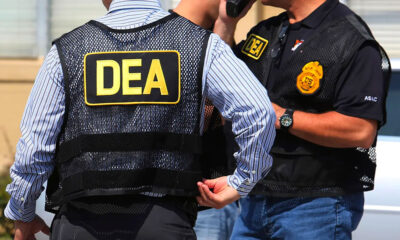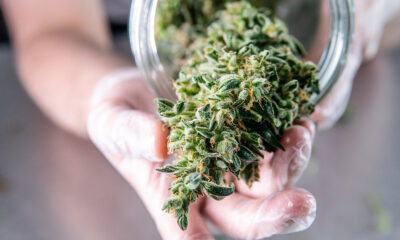
Economics
The DEA Must Be Joking About Their Plan to Burn All the Weed in the U.S.
The federal drug-control agency has a hilarious numbers problem.
Cannabis is as American as baseball. Actually, that trope is wrong. In this country, cannabis has a longer history — and in today’s world, cannabis may actually be a more influential cultural export.
According to the U.S. Drug Enforcement Administration’s official website, cannabis “is the only major drug of abuse grown within the U.S. borders.” Legal marijuana grown in California and Colorado now makes its way to the United Kingdom, which, in colonial days, encouraged American colonists to cultivate hemp as raw material for producing rope, sails, and clothing — a very long route of return. (It’s a happy accident that Major League Baseball will follow tins of branded California cannabis to London this summer, for the first overseas MLB games played somewhere other than Japan.)
Baseball wishes it was American as cannabis.
So it seems counterintuitive, or at least historically unsound, that the DEA would suffer from an unhealthy and unrealistic obsession with cannabis. But that’s the only way to explain why the agency began advertising in late March for a Houston-area contractor with the power to incinerate “at least” 1,000 pounds of marijuana a day, for eight hours a day, which is more than 13 times the sum total of all the marijuana the DEA seizes in a year.
Feds Light Up More Than They Can Blaze
CBS affiliate KHOU-11 in Houston was the first to report that the federal drug agency is looking for a private contractor with both massive burning capacity and a secure facility equipped with video surveillance in which to do the burning. The DEA needs “papers, cassette tapes… pharmaceuticals, and other incidental controlled substances” incinerated. The agency also needs whomever is doing the burning to be able to handle “at least 1,000 pounds of marijuana per day and for a minimum of eight hours a day,” according to KHOU.
The DEA anticipates needing this burning desire between now and Sept. 30, the end of the fiscal year, and will require it to be mobile, with “work… required” in border cities like Galveston, Brownsville, Corpus Christi and in other areas not far from the Mexican border.
The posting is bizarre for a host of reasons and could portend the country’s most sweeping marijuana eradication effort in history, a simple math error, or wishful thinking so fanciful it resembles a fever dream.
Cannabis is a domestic drug, as the DEA itself admits. Marijuana does come from Mexico, but less so than ever before. Given the flooded markets in legal states like Oregon and California, it’s probably safe to assume that even if the “narco tunnels” were cannabis trains, drug smugglers would not be able to compete. For context, a 70-pound seizure was enough to make news recently in El Paso. Such a seizure would have to become routine in order for the DEA to need so much burning capacity.
In 2017, the most recent year for which data is available, the DEA reported the seizure of 151,444 pounds of marijuana in America. Almost 75 percent came from two states: California (91,871 pounds) and Washington (21,277 pounds). Both of those states are a long way away from Texas, where the DEA is looking for someone who could torch Washington’s annual stash, a good bulk of its year’s work, in less than three days.
Taking weekends off, the DEA needs only destroy 600 pounds per business day to eliminate all the weed seized in 2017. Why it’s looking for someone to work for eight hours a day when it has barely work enough to keep someone busy for a full hour isn’t clear and makes absolutely no sense, unless someone in a DEA press office was bored and wanted a story to go viral.
In a statement sent to KHOU, the DEA explained that “this is a complicated, large-scale government contract we’re required by law to bid every few years, and there are usually only a handful of companies with the necessary facilities and resources to help us dispose of this material.”
“While it makes for an interesting headline, the truth is far more prosaic,” the DEA continued. “[O]ur agents working across the Houston Division make a huge number of great cases, and as a result, we seize a tremendous amount of illegal drugs. Arranging for the safe [sic] and effective destruction of these drugs is just part of the job.”
According to the DEA’s own statistics, the DEA seized 172 pounds of processed marijuana in all of Texas in 2017, or about six minutes’ worth of work for their contractor.
More cannabis than that was seized in the state that year by other law enforcement, but even allowing for that, 8,000 pounds a day is a cartoonish and arbitrary number the DEA is presenting for reasons it seems unwilling to impart to the public. Drug agents have often been accused of inflating numbers — weighing dirt seized in grows, for example — to inflate their own importance, but this is one of the most baffling examples yet.
TELL US, have you noticed any other government agencies making crazy claims about cannabis?


























